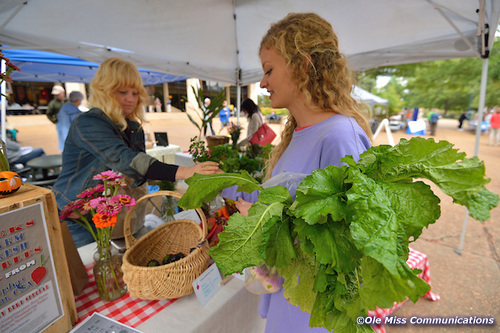Food Sustainability

Photo by Robert Jordan/Ole Miss Communications
Eating is not only a biological need, but also one of cultural significance and connection. Our eating habits are shaped by our sociological and economic histories, our regional geography, and by policy. Our decisions about food are connected in a larger system that ultimately has a significant influence on our natural environment. Food, agriculture and land use practices account for twenty-four percent of global greenhouse gas emissions. In the United States, nearly half of the food we produce ends up in landfill, accounting for twenty-one percent of the U.S. waste stream and twenty percent of U.S. methane emissions.
Highlighted Initiatives:
UM Food Day
UM Food Day is celebrated throughout October and includes fun and engaging events such as a campus farmer’s market, panels on food sustainability topics, film screenings, and more.
Certified Green Restaurants
Rebel Market and Lenoir Dining are Certified Green Restaurants. They are the first restaurants in the state to earn this designation, which is based off of several metrics including energy usage, sourcing, waste reduction, and composting.
UM Compost Program
The UM Compost Program has composted over 100,000 lbs of pre-consumer food waste from campus dining facilities since its inception in 2013. It is the first program of its kind in the state.
Partnership in Academics
The Office of Sustainability partners with Nutrition and Hospitality Management through class projects and by hosting graduate students for a sustainability rotation in the Coordinated Program in Dietetics.
UM Garden Club
The UM Garden Club provides students, faculty and staff with an on-campus opportunity to grow fresh produce and learn about gardening and food security.
UM Food Bank
The UM Food Bank serves the campus community with free pantry staples, including fresh produce from the UM Garden.
Guide to Eating Local
The Office of Sustainability developed the Guide to Eating Local, which includes information about local farmers markets, including the Oxford Community Market, Midtown Farmers’ Market, and Chicory Market, a local sustainable grocery store.
Vegetarian Guide
To help make meat-free dining more accessible to the UM community, the Office of Sustainability has prepared a guide to vegetarian dining options on the University campus. Access the guide and learn more about vegetarian dining at the University and in Oxford here.
Closing the Loop
Because of the interconnected nature of food, waste and energy, the Office of Sustainability prioritizes projects that fit together within a larger system. An example of this kind of closed loop system can be found with the UM Food Bank, which uses fresh produce grown from the UM Garden. The UM Garden uses compost made from campus food waste. By using campus food waste that would otherwise be disposed of in landfill, we are simultaneously reducing waste and addressing a small facet of campus food insecurity.